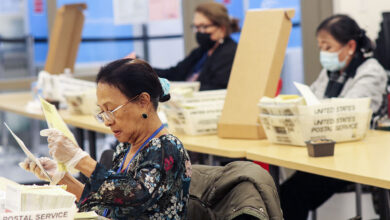In the 19 March referendum on constitutional amendments, 77 percent of Egyptians voted in favor of holding elections before drafting the new constitution. This was the only clean referendum in Egyptian history, despite a few procedural glitches and the fact that religion was used to influence some people’s decisions. Still, it’s unacceptable to refuse the outcome of this vote or to accuse voters of not knowing what’s best for them. We have to respect the choice of the people even if we don’t like it.
The proposal now being floated by some groups to draft the new Egyptian constitution before elections may make sense, but we cannot overturn a choice that Egyptians made collectively, especially considering the amount of debate that took place before the vote. In the wake of the first democratic poll in Egyptian history, our response should not be to undermine the practice of democracy itself. This would be reminiscent of Mubarak-era policies.
Nobody should be under the impression that drafting the constitution first would be free of any challenges. There are currently two proposals for how the constitution could be written first. In the first scenario, the people would elect a panel of specialists to draft the constitution. Under such a process, there’s no guarantee the panel would be representative of all sectors of Egyptian society. Amidst intense competition, the more marginalized social and political groups may not be able to secure representation on the panel. This is the same fear that many people have should the elections be held first and certain groups, like the Muslim Brotherhood, win a parliamentary majority and write a constitution of their choosing.
In the other scenario, the Supreme Council of the Armed Forces (SCAF) would consult with different figures from the political elite and select a panel to write the constitution before putting it to a public referendum. It would be clear to members of this panel that they would not make any drastic changes to the articles of the 1971 constitution: they would keep the presidential system, establish a democratic basis for the state and include the eight constitutional amendments proposed by the constitution amendment committee in March. The panel should also remove all freedom-restricting articles in the old constitution, keep Article 2 that acknowledges Egypt’s Islamic identity and add stipulations to safeguard the rights of Christians.
The only revolutionary change this panel may introduce is the abolition the 50 percent parliamentary quota for farmers and workers. This scenario, however, is not entirely democratic and may pave the way for many disputes. The SCAF may very likely be accused of favoring certain members to join the panel at the expense of others.
The reality is that whether the constitution is written before or after elections, the process may be fraught with problems of representation unless the right safeguards are put in place. As we appear to be moving towards parliamentary elections in September the real question is what can we do to establish those safeguards and ensure progress towards democracy?
First, we need to formulate a set of supra-constitutional principles to be included in any future constitution, such as stipulations to safeguard the civil nature of the state and the republican system.
Second, certain criteria should be established for selecting members of the constitution panel. The SCAF can be authorized to reject the panel should it deem it to be insufficiently representative of Egyptian society.
Third, the SCAF should call on all Egyptian political forces to engage in a dialogue to find some common ground. Parties that ruined national dialogues in the past should be completely excluded. If these discussions can produce a consensus on the broad outlines of the constitution that will be an important step forward.
No matter which comes first, elections or the constitution, there are risks involved. The difference is that by holding elections first we would be showing respect for the Egyptian people’s democratic choice. More worrisome than the order of events is the fact that we have start from scratch. It’s possible for us to achieve democracy through a broad and inclusive agreement on a general framework, which we can then amend after the elections. But leaving the constitution in the hands of the majority – either through an elected parliament or constitutional assembly that does not represent minorities and marginalized groups – would pose a substantial danger.
Translated and abridged from the Arabic Edition.




